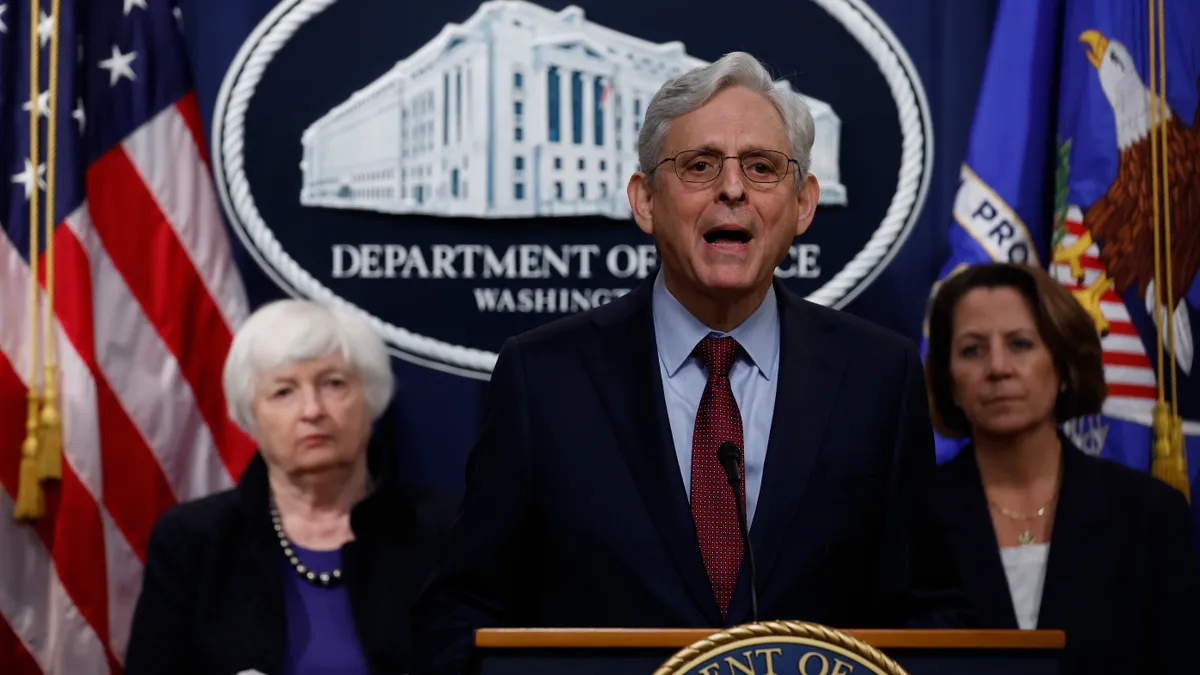Dive Brief:
- The Department of Justice calls the $4.3 billion in penalties it imposed on crypto exchange Binance Nov. 21 for violating federal banking laws one of the largest ever and yet it could have been larger, the agency says.
- The company agreed to $2.5 billion in forfeitures and $1.8 billion in fines for failing to register as a money services business and implement an anti-money laundering program despite generating about a fifth of its business in the United States.
- “If you serve U.S. customers, you must obey U.S. law,” Deputy Attorney General Lisa Monaco said in a statement.
Dive Insight:
The penalty amount is based on federal sentencing guidelines. The agency said it applied a 20% reduction to the bottom of the applicable fine range to credit the company for its cooperation after the investigation began and for taking steps to fix its compliance program.
The company could have received a larger credit but its cooperation only extended so far, the agency said.
Binance “delayed producing relevant evidence, including recorded meetings in which Binance executives discussed U.S. legal requirements,” the agency said.
Under its cooperation credit program, depending on the alleged violations and the level of cooperation, among other things, companies can get up to 100% of their fines waived and, if they voluntarily self-disclose misconduct, avoid prosecution altogether in some cases.
According to the agency, the evidence showed that Changpeng Zhao, the company’s CEO until his resignation Nov. 21, and other executives decided to violate U.S. law rather than put in place controls that would prompt many customers to go to other exchanges by taking away their anonymity.
“They concluded that complying with U.S. law would stifle their efforts to grow Binance’s profits, market share, and trading volume,” Attorney General Merrick Garland said in announcing the resolution in which both the company and Zhao agreed to plead guilty.
In addition to failing to register with the U.S. Treasury as a money services business and implement an anti-money laundering program, the company failed to stop U.S. customers from conducting transactions with people in sanctioned jurisdictions, including Iran, Syria, Russia and Russian-occupied parts of Ukraine.
“Because of this intentional failure … Binance willfully caused over $898 million in trades between U.S. users and users ordinarily resident in Iran,” the agency said.
It also allowed transfers of approximately $106 million from Hydra, a Russian darknet marketplace, and $275 million from Bestmixer, a big “anonymizing” service before it was shut down for money laundering.
The company was also accused of trying to deceive regulators by creating a separate, law-abiding platform for U.S. customers but secretly keeping its biggest U.S. customers on its main platform through accounts designed to obscure their nationality.
“Binance executives, including Zhao, made a plan to contact VIP customers and help the VIP register a new account for an offshore entity and transfer holdings to that account,” the agency said. “Binance employees also called U.S. VIPs to encourage them to provide information that suggested the customer was not located in the United States.”
In a statement, the company says it’s making up for lost time on compliance.
“Binance takes responsibility for this past chapter,” it said. “Over the past two years, we have worked hard to restructure our organization and personnel and upgrade our systems.”
As part of its settlement, the company has agreed to retain an independent compliance monitor for three years and remediate and enhance its anti-money laundering and sanctions compliance programs.
Zhao, the former CEO, agreed to pay a $50 million fine and faces up to 18 months in prison.
A court filing shows that he paid a $175 million personal recognizance bond, and placed $15 million in a separate trust account that he will forfeit if he violates terms of his bail, according to a Banking Dive report. A sentencing hearing is scheduled for Feb. 23.
Zhao is being replaced as CEO by Richard Teng, the company’s global head of regional markets.











